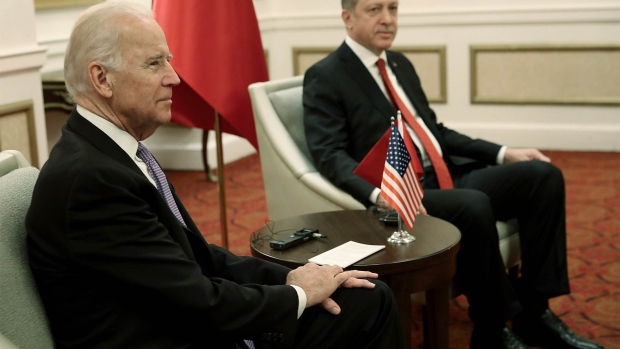Apr 25, 2021
Biden Marks Armenian ‘Genocide’ in Challenge to Ally Turkey
, Bloomberg News

(Bloomberg) -- President Joe Biden commemorated the 106th anniversary of the mass killing of Armenians by twice calling it a “genocide” -- a word no U.S. leader since Ronald Reagan has used to describe the event for fear of alienating NATO ally Turkey.
In response, a spokesman for Turkey’s president suggested the U.S. look at its own history.
“The American people honor all those Armenians who perished in the genocide that began 106 years ago today,” Biden said in a written statement timed to Saturday’s commemoration of Armenian Genocide Remembrance Day.
“One and a half million Armenians were deported, massacred, or marched to their deaths in a campaign of extermination,” Biden said. “We remember the lives of all those who died in the Ottoman-era Armenian genocide and recommit ourselves to preventing such an atrocity from ever again occurring.”
The move fulfills a campaign promise to Armenian-Americans, but risks pushing Turkey further into Russia’s orbit. Turkey has denied that its predecessors in the Ottoman Empire committed wholesale atrocities, calling the allegations “slander,” and suggesting that Biden’s declaration was more about domestic politics.
Turkish Foreign Minister Mevlut Cavusoglu responded quickly on Twitter, saying his country has “nothing to learn from anybody about our own past.”
The ministry issued a statement saying the U.S. had opened “a deep wound that undermines our mutual trust and friendship.”
The U.S. president had made a “grave mistake,” the ministry said, adding that Biden was under the sway of “radical Armenian circles and anti-Turkey groups.”
Biden’s statement came a day after his first phone call as president with his Turkish counterpart, Recep Tayyip Erdogan, in which he gave advance notice of the statement and used the word “genocide,” according to officials familiar with the call.
Ibrahim Kalin, a spokesman for Erdogan, said Saturday that the U.S. had repeated the “slander” toward Turkey. “We recommend that the U.S. President look at his own history and present.
Neither side on Friday mentioned the contentious issue in their formal statements about the discussion, and instead focused on a planned meeting at the NATO summit in Brussels in June.
Still, the Turkish lira dropped 1% against the dollar on the news Friday, extending the Turkish currency’s week-long slide to 3.9%.
As Turkey braced for the Biden statement, officials there warned that the move would severely damage relations between the countries.
“The best way for President Biden to ruin what is left of Turkish-American relations is for him to acknowledge the false Armenian allegations that the Ottoman Turks performed an act of genocide early last century,” Ilnur Cevik, a senior adviser to Erdogan, said Friday on Twitter.
Shortly before the White House released Biden’s statement, Turkey’s president sent a commemoration message to Sahak Mashalian, who serves as the Armenian Patriarch of Istanbul.
“I respectfully commemorate the Ottoman Armenians, who lost their lives under the difficult circumstances of World War I, and offer my condolences to their grandchildren,” Erdogan said. “The politicization of debates, which historians ought to engage in, by third parties and their use as a tool of meddling has not served anyone’s interests.”
Reagan was the last U.S. president to call the atrocities committed against the Armenians a genocide, in 1981. He soon backtracked under pressure from Turkey, the successor state to the Ottoman Empire, which collapsed after the end of World War I.
Erdogan on Wednesday said that his administration “will continue to defend the truths in the face of the lie of ‘genocide of Armenians’ and those who are backing this slander with political calculations,” according to the state-run Anadolu Agency.
Turkey has been a key U.S. strategic partner, providing a bridge to the Islamic world and countering Russian ambitions. But increasing friction on a number of issues -- including Erdogan’s increasingly heavy hand against political opponents and the press -- has led Turkey’s leader to seek a closer relationship with Moscow.
The U.S. has imposed sanctions on Turkey and cut it out of Lockheed Martin Corp.’s F-35 fighter program --unprecedented for a NATO ally -- after Turkey began purchasing S-400 anti-aircraft missiles from Russia.
Although Russia has recognized the Armenian genocide for decades, Moscow appeared eager to use Biden’s move to drive a wedge into NATO. The Russian state news agency TASS reported that the Biden administration “is making it clear that it actually does not view Erdogan as a partner and a politician worth betting on, and will build relations with him from the position of force.”
President Barack Obama, critical of the George W. Bush administration’s failure to use the word “genocide,” made a campaign promise to change course. Over eight years he offered increasingly strong condemnations -- calling the 1915 events “the first mass atrocity of the 20th century” in which 1.5 million Armenians “were deported, massacred, and marched to their deaths in the final days of the Ottoman Empire.” He didn’t use the word genocide, though, instead recognizing the anniversary as “Armenian Remembrance Day.”
The word “genocide” carries a particular stigma under international law, which defines it as the injuring or forcible removal of people with “intent to destroy, in whole or in part, a national, ethnic, racial or religious group.”
The nation’s leading Armenian-American group said Biden’s recognition was an important step toward human rights into the 21st century.
“President Biden’s affirmation of the Armenian Genocide marks a critically important moment in the arc of history in defense of human rights. By standing firmly against a century of denial, President Biden has charted a new course. Affirmation of the Armenian Genocide enhances America’s credibility and recommits the United States to the worldwide cause of genocide prevention,” said Armenian Assembly Executive Director Bryan Ardouny.
(Updates with Erdogan comments from 15th paragraph.)
©2021 Bloomberg L.P.







